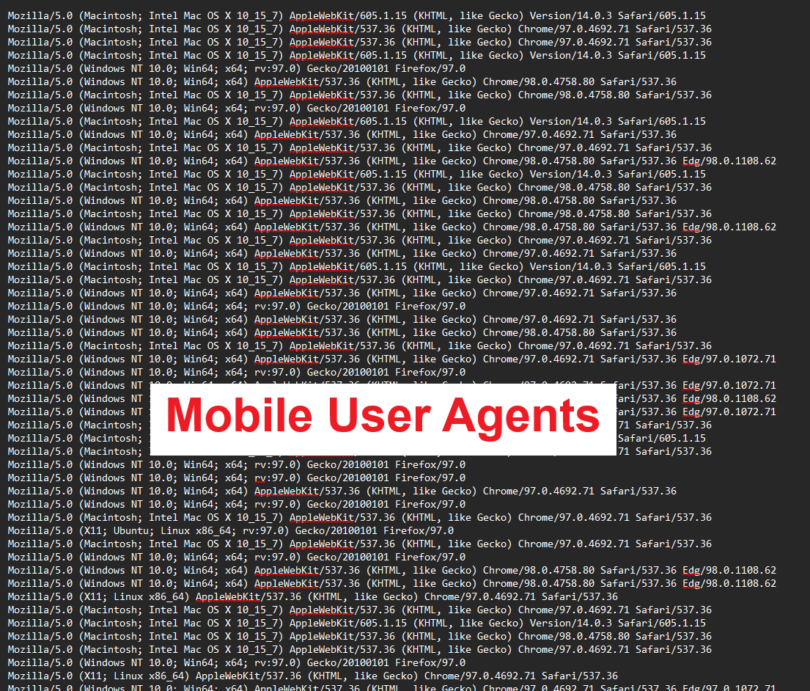Understanding Mobile User Agents
What Are Mobile User Agents?
A mobile user agent is a type of user agent string that identifies a browser running on a mobile device, such as a smartphone or tablet. It tells the website you’re visiting that you’re using a mobile device, enabling the site to adjust its layout and content accordingly.
How Mobile User Agents Differ from Desktop User Agents
While desktop user agents might indicate a browser running on a Windows or macOS system, mobile user agents provide details specific to mobile platforms like Android and iOS. They usually include the operating system version and device type to help websites determine the best way to render content for smaller screens.
How User Agents Work
Anatomy of a User Agent String
A user agent string contains multiple pieces of information that describe the user’s browser and device. A typical mobile user agent string might look like this:
Mozilla/5.0 (Linux; Android 10; SM-G973F) AppleWebKit/537.36 (KHTML, like Gecko) Chrome/91.0.4472.124 Mobile Safari/537.36
In this example:
- Linux refers to the underlying OS (in this case, Android).
- Android 10 is the version of the operating system.
- SM-G973F is the device model (Samsung Galaxy S10).
- Chrome/91.0.4472.124 is the browser version.
- Mobile Safari/537.36 indicates it’s a mobile browser based on WebKit.
Examples of Mobile User Agent Strings
- Android:
Mozilla/5.0 (Linux; Android 11; Pixel 4) AppleWebKit/537.36 (KHTML, like Gecko) Chrome/91.0.4472.120 Mobile Safari/537.36 - iOS:
Mozilla/5.0 (iPhone; CPU iPhone OS 14_4 like Mac OS X) AppleWebKit/605.1.15 (KHTML, like Gecko) Version/14.0 Mobile/15E148 Safari/604.1
Why Mobile User Agents Matter
Optimizing User Experience for Mobile Devices
Mobile user agents are crucial because they allow websites to adapt their content for the mobile browsing experience. Websites can use this information to display a mobile-optimized version, ensuring faster load times and an interface suited for touch interactions.
Mobile-First Indexing and SEO Implications
In 2018, Google introduced mobile-first indexing, meaning the mobile version of a website is used for indexing and ranking in search results. This makes it more important than ever for websites to cater to mobile user agents.
Common Types of Mobile User Agents
Android User Agents
These user agents represent devices running on Google’s Android operating system. They include information about the Android version and device model.
iOS User Agents
iOS user agents are specific to devices running Apple’s mobile operating system, including iPhones and iPads. These user agents usually indicate the iOS version and device type (e.g., iPhone or iPad).
Tablet User Agents
Tablet user agents are slightly different from smartphone user agents, as they often signify a larger screen size. Websites may serve different layouts for tablets compared to smaller mobile phones.
How Websites Identify Mobile User Agents
User Agent Detection Techniques
Websites use user agent detection to identify the type of device visiting the site. Based on the user agent string, websites can serve mobile-optimized content, redirect users to mobile-specific sites, or adjust layout elements for better performance.
Adapting Content Based on User Agents
By detecting mobile user agents, websites can:
- Display content in a responsive format.
- Serve smaller image files to reduce load times.
- Use touch-friendly navigation elements, such as larger buttons.
The Role of Mobile User Agents in Web Development
Responsive Design and Mobile User Agents
Responsive design ensures that web pages adjust dynamically to fit different screen sizes. Mobile user agents help in identifying the device type so the website can render the correct layout.
Handling Mobile User Agents in JavaScript
Developers can write JavaScript code to detect mobile user agents and apply custom styles or redirect users to mobile-friendly versions of the site.
Mobile User Agents and Web Scraping
Using Mobile User Agents for Web Scraping
For those involved in web scraping, using mobile user agents can help mimic real mobile browsers and prevent detection by websites.
Avoiding Detection During Scraping
Randomizing user agents and mimicking mobile browsers can reduce the likelihood of being flagged or blocked by websites during automated scraping.
Mobile User Agents in SEO
The Role of Mobile User Agents in Search Engine Optimization
Mobile user agents play a critical role in SEO, especially with mobile-first indexing. Search engines prioritize content that performs well on mobile devices, so using mobile user agents in testing is essential.
How Mobile User Agents Affect Page Rankings
If a website doesn’t display correctly on mobile devices, it could suffer lower rankings in mobile search results. Testing with mobile user agents ensures that a site meets mobile SEO standards.
Challenges with Mobile User Agents
Device Fragmentation and Compatibility Issues
The variety of mobile devices and operating systems can lead to device fragmentation, making it difficult to ensure compatibility across all platforms. User agents help identify these differences, but developing a universally compatible site remains challenging.
Limitations of User Agent Detection
Relying solely on user agent detection can lead to incorrect assumptions about device capabilities. For example, a tablet might be misidentified as a mobile phone, leading to a poor user experience.
Tools for Testing Mobile User Agents
Browser Developer Tools for Mobile User Agents
Most modern browsers have built-in developer tools that allow you to simulate mobile user agents. For example, Google Chrome’s Developer Tools let you view a site as it would appear on a variety of mobile devices.







